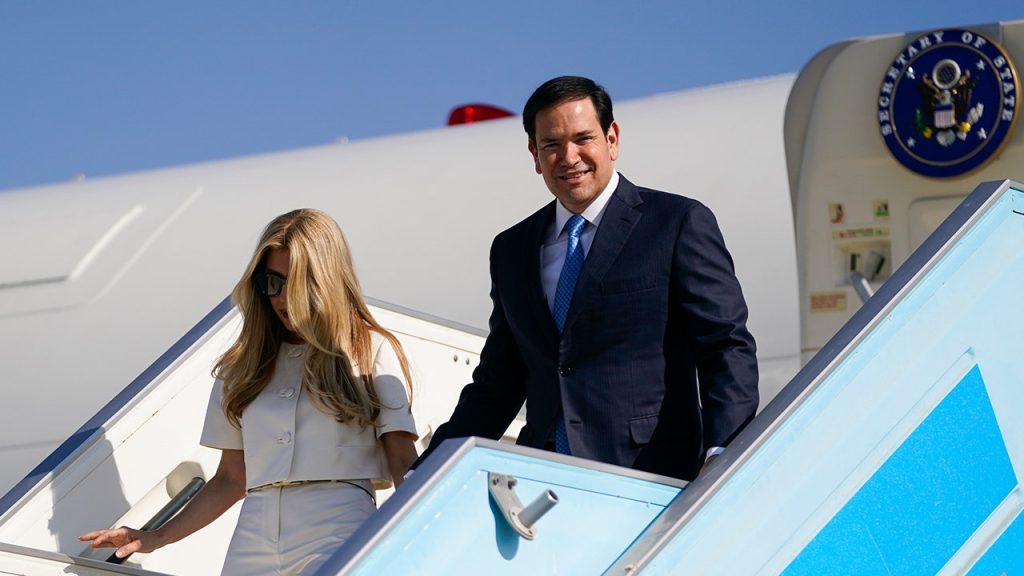Secretary Rubio Reaffirms U.S.-Israel Alliance Despite Recent Tensions
In a comprehensive interview with Fox News in Jerusalem, Secretary of State Marco Rubio emphasized that the U.S.-Israel relationship remains steadfast despite recent complications. Following Israel’s controversial strike targeting Hamas negotiators in Qatar last week, Rubio acknowledged the tension but maintained, “We’re going to continue to be strong allies and partners.” His comments come at a critical juncture in Middle East diplomacy, as he prepares to visit Doha to encourage Qatar’s continued involvement in Gaza peace efforts and hostage negotiations. The Secretary recognized Qatar’s frustration over the Israeli strike but stressed the importance of looking forward rather than dwelling on past events. “We want everybody focused on what comes next,” Rubio explained, highlighting the urgency of resolving ongoing regional challenges that affect both American and Israeli interests.
The Secretary’s upcoming visit to Qatar represents a delicate diplomatic mission following the recent Arab-Islamic summit hosted there, which produced a draft resolution blaming Israel for “threatening the prospects of peace and coexistence in the region.” Despite this backdrop of regional criticism, Rubio emphasized America’s commitment to maintaining productive relationships with all parties involved in the peace process. When pressed about Israel’s potential annexation plans in parts of the West Bank, Rubio declined to state explicit U.S. support but suggested such actions might be a response to international pressure. He specifically pointed to declarations from European nations and Canada regarding Palestinian statehood recognition, arguing these moves have “real-world implications in terms of making it harder to achieve peace.” This framing suggests the Biden administration may be sympathetic to Israel’s position while still trying to navigate the complex terrain of Middle East peace negotiations.
On matters beyond the Israeli-Palestinian conflict, Rubio addressed recent Russian military provocations in Eastern Europe, including drone incursions in Poland and Romania. He rejected the notion that these actions indicated Russian President Vladimir Putin felt “emboldened” following his summit with President Trump. Instead, Rubio characterized these incidents as typical escalations in ongoing conflicts, noting that “wars generally will escalate. They’ll actually get worse, not better.” The Secretary pointed out that Ukraine has also conducted strikes inside Russian territory, framing these mutual actions as part of the natural, if unfortunate, progression of warfare. He connected these developments to the President’s stated desire to bring the Russia-Ukraine conflict to a conclusion, suggesting that such incidents demonstrate why ending the war should be a priority for all parties involved.
The conversation shifted to American policy in Venezuela, where Rubio forcefully defended the recent U.S. announcement of a $50 million reward for information leading to the arrest of Venezuelan leader Nicolas Maduro. Pushing back against characterizations that this represented a “bounty,” Rubio emphasized the legal foundations for the U.S. position. “Nicolas Maduro was indicted by the Southern District of New York. A grand jury returned an indictment,” he explained, framing the matter as one of law enforcement rather than political intervention. The Secretary pointedly refused to acknowledge Maduro as Venezuela’s legitimate president, instead describing him as “someone who’s empowered himself of some of the instruments of government” to operate what Rubio characterized as a drug trafficking operation that directly threatens American security interests.
Throughout the interview, Rubio demonstrated the Biden administration’s approach to balancing immediate crises with longer-term strategic interests across multiple international flashpoints. On Israel, he walked a careful line between acknowledging tensions over specific incidents while reaffirming the fundamental alliance. Regarding Ukraine, he contextualized Russian provocations within the broader pattern of conflict escalation while subtly suggesting the administration favors a negotiated conclusion to the war. His comments on Venezuela revealed a harder line, justifying aggressive U.S. policy as a response to direct threats to American security rather than mere political differences. In each case, Rubio articulated positions that blend traditional diplomatic language with pragmatic assessments of complex international challenges.
The Secretary’s remarks come at a moment of significant international instability, with conflicts in Gaza, Ukraine, and political turmoil in Venezuela all demanding American attention simultaneously. His emphasis on looking forward rather than dwelling on past events suggests an administration focused on practical outcomes rather than ideological positions. By framing U.S. policy in terms of specific American interests – securing hostages in Gaza, bringing the Ukraine conflict to a conclusion that preserves Ukrainian sovereignty, combating drug trafficking from Venezuela – Rubio presented a vision of American foreign policy grounded in concrete objectives rather than abstract principles. This approach appears designed to appeal to domestic audiences across the political spectrum while maintaining flexibility in America’s international engagements during a period of global uncertainty.
As Rubio prepares for his diplomatic mission to Qatar, his comments reflect the delicate balancing act facing American foreign policy: maintaining strong traditional alliances while adapting to rapidly changing circumstances. His assessment that “we still have these problems we have to solve” captures both the continuity in American foreign policy priorities and the pragmatic recognition that international challenges rarely present clean or simple solutions. Whether discussing Israel’s military operations, Russian provocations, or Venezuelan leadership, the Secretary consistently returned to a focus on practical next steps rather than assigning blame or making moral pronouncements – a diplomatic approach that prioritizes progress over posturing in a complex international environment.


